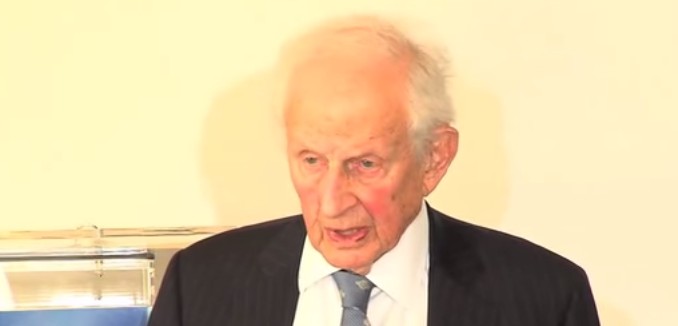The nuclear deal with Iran must not allow Iranian perpetrators of terror to escape justice, former Manhattan District Attorney Robert Morgenthau wrote in a commentary for Reuters today.
Put simply: Iran sponsors terrorism. I am convinced I could prove that proposition in a court of law, and indeed some Americans have done so. Survivors of terrorist attacks have sued the Iranian government in American courts, and won significant judgments.
But the Iranian government has refused to pay those judgments, and the proposed agreement does nothing to challenge that intransigence. In fact, the agreement would release up to 150 billion dollars of frozen assets to Iran, without requiring that a dime go to paying off the survivors of Iran-sponsored terror. …
But the world has within its grasp those peaceful means, in international sanctions, and those sanctions should be strengthened, not abandoned, so long as Iran sponsors terror against civilian populations and foments unrest among its neighbors. Some of those individuals and entities who will be removed from the sanctions list are associated with terrorism in addition to nuclear proliferation.
Morgenthau brought up the case of Ahmad Vahidi, who is wanted by Interpol for his role in the bombing of the AMIA Jewish center in Buenos Aries in 1994. The deal will Free Vahidi from European sanctions “before he ever faces the bar of justice.”
It would be “a mistake of historic proportions,” Morgenthau added, if sanctions on Iranian individuals and entities who perpetrated terror were lifted “without evidence that Iran has ceased its sponsorship of such attacks, and without a permanent end to their ambitions to build a nuclear weapon.”
Morgenthau compared the sanctions against Iran to the sanctions thirty years ago against apartheid South Africa. He noted that in the 1980’s, Congress extended sanctions on the country over then-President Ronald Reagan’s objections; five years later, South Africa’s government fell. While Morgenthau didn’t draw an explicit comparison between the events of thirty years ago and today, he observed that “moral issues must be met – with principle.” Today, the moral issue is Iran’s support of “terror and aggression.”
Two months ago, Morgenthau wrote an op-ed (Google link) in The Wall Street Journal that faulted President Barack Obama for ignoring Iran’s support of terror. In that earlier essay, Morgenthau concluded, “Any deal that fails to address or curtail Iran’s role as a state sponsor of terrorism—and that actually undercuts our ability to confront that threat—is a deal that we must not make.”
Another of Iran’s masters of terror is Gen. Qassem Suleimani, who under the terms of the deal will be freed from European and United Nations sanctions. Lt. Gen. (ret.) Michael Barbero, who lost many men to Suleimani’s forces in Iraq, called the lifting of sanctions a “shameful betrayal” of American soldiers who were killed and maimed by Suleimani and his troops.
[Photo: JBS / YouTube ]




